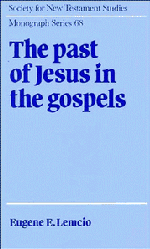Book contents
- Frontmatter
- Contents
- Acknowledgments
- List of abbreviations
- 1 Introduction: faith, kerygma, gospels
- 2 Mark
- 3 Matthew
- 4 Luke
- 5 John
- 6 Summary and implications
- Appendix The unifying kerygma of the New Testament
- Notes
- Bibliography of works cited
- Index of biblical references
- Index of modern authors
- Index of subjects
6 - Summary and implications
Published online by Cambridge University Press: 06 November 2009
- Frontmatter
- Contents
- Acknowledgments
- List of abbreviations
- 1 Introduction: faith, kerygma, gospels
- 2 Mark
- 3 Matthew
- 4 Luke
- 5 John
- 6 Summary and implications
- Appendix The unifying kerygma of the New Testament
- Notes
- Bibliography of works cited
- Index of biblical references
- Index of modern authors
- Index of subjects
Summary
It would not be an overstatement to say that, until this decade, critical study of the NT in general and of the gospels in particular has been dominated by historical concerns. Scholars have traced the “story” of manuscripts, words, sources, traditions, gospels, and hellenistic (including Jewish) religions. But only within the last ten or fifteen years have the texts qua texts been studied for the story qua story of Jesus. Formal scrutiny of the narrative has been aided by the presuppositions and methods of literary-critical study in general. Of course, depending on the variety of such examination, it too can become historical, especially when the effect of a text on the reader's/listener's history becomes the primary concern. Now, however, the subject stands in front of the literature rather than behind it.
Certainly, it would be a mistake to regard each of these separate tasks as isolated. Indeed, overlapping occurs among the various historical disciplines themselves and between historical and literary study. In the end, the question becomes one of emphasis. Where will one put the stress? What am I trying to do? Perhaps it is not presumptuous to suggest that my work can assist in the performance of several critical tasks. In particular, redaction and literary critics might benefit by being able to give a more precise account of how the past of Jesus has been represented in the gospels. (This has bearing on life-of-Jesus research, about which more will be said later.)
- Type
- Chapter
- Information
- The Past of Jesus in the Gospels , pp. 107 - 114Publisher: Cambridge University PressPrint publication year: 1991



